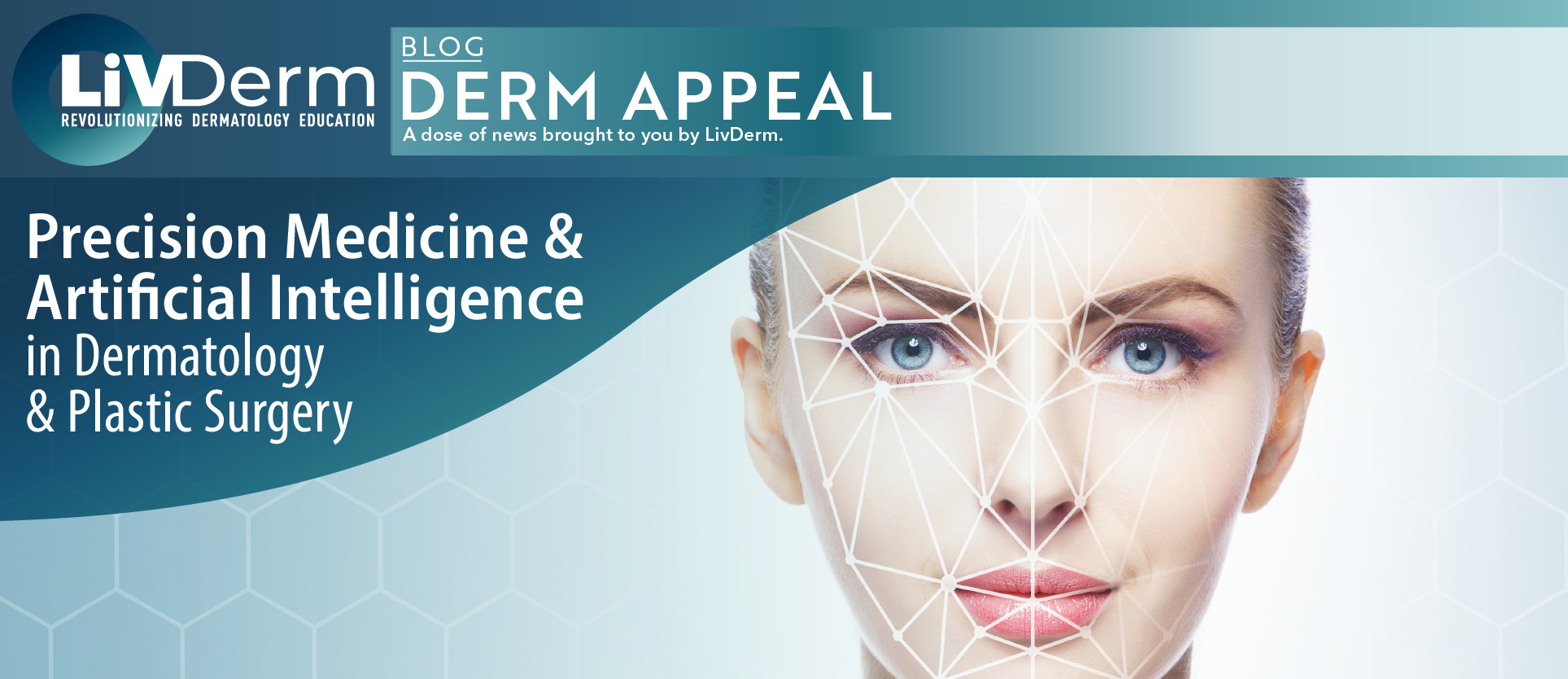Technological expansion and the increased digitization of the medical field have led to a shift toward a more computer-based clinical practice, as both a method of synthesizing immense amounts of patient data and increasing provider efficiency. Awareness of the importance of artificial intelligence (AI) software and its vast possibilities is growing nationwide – with increasing evidence of its application being demonstrated in healthcare specifically. In part due to the advent of AI machines, the practice of individualized evidence-based medicine – or precision medicine – is becoming more prevalent, helping clinicians provide more accurate, personalized treatment and prevention strategies specialty-wide.
The rise of AI and precision medicine alongside their many potential uses may have a significant impact on plastic surgery practices. Underscoring the importance of implementing forthcoming digital technologies in the clinical setting, authors of an article published in Plastic Reconstructive Surgery Global Open explore the role of big data in AI, how it can be used to improve precision medicine, as well as the potential clinical applications of AI in plastic surgery.
Precision Medicine
Referred to as precision medicine or personalized medicine, this emerging approach to patient care relies on extensive patient data – factoring in genetics, environment, and lifestyle metrics – to devise optimal treatment and prevention strategies for each individual. In stark contrast to the traditional one-size-fits-all method in which disease treatment is standardized and broadly applied to all patients, precision medicine allows clinicians to deliver the most effective care based on a holistic understanding of patient health. However, as a growing approach to healthcare, precision medicine requires powerful tools – including artificial intelligence and advanced machine learning algorithms – before it can be integrated into daily clinical practice and applied to the general population. Nonetheless, it holds the potential to revolutionize healthcare as we know it.
AI-based precision medicine relies on the ubiquity of big data – the growing availability of digital health records, at-home genetic screenings, demographic data, and continuous patient data from wearable monitoring devices. Through rapid quantification and pattern recognition, big data techniques can optimize the practice of personalized medicine by providing quick, coherent analysis and expanding the capacity for information storage; they can enhance the ability to analyze, interpret, and make decisions based on extensive data sets. Utilizing analytic technologies, such as artificial neural networks (ANNs), algorithms are able to quantify and organize data to recognize patterns otherwise missed by human practitioners. Incorporating these technologies into the plastic surgery setting would allow surgeons to quickly access data stored in electronic health records, providing them with insight into patterns recognized by ANNs to assist in making the most accurate diagnostic and treatment decisions.
Artificial Intelligence
Now significantly more prevalent within the healthcare industry, artificial intelligence-based technology has begun to slowly infiltrate the practice setting. More frequently, it is being used to aggregate overwhelming amounts of patient data, conduct skin cancer examinations, and even predict the post-operative results of cosmetic surgery procedures. Artificial intelligence can provide a much-needed alternative to manual data input and interpretation, using computer algorithms to provide quicker, more efficient analyses and instant feedback. Utilizing such systems will allow clinicians to better incorporate patient-specific precision medicine strategies, note the authors of the paper: “We envision that when the field of plastic surgery embraces big data, the cognition involved in patient diagnosis, surgical planning, and outcome assessment may be accomplished by the computer.”
Potential Clinical Applications in Plastic Surgery
Regarded as innovators and early adopters, plastic surgeons often stand at the forefront of novel medical advancements, incorporating new technologies into their practice with ease. With the steady growth of AI technologies, it is becoming increasingly important for surgeons to remain adaptable and ready to integrate these digital systems into practice. To prepare physicians for the imminent change ahead, authors of the article discuss potential clinical applications of artificial intelligence in plastic surgery alongside their many benefits.
Breast Surgery
Using AI to inform the decision-making process, precision medicine can elucidate patient-specific risks for breast-related diseases in breast augmentation, reduction, and cancer reconstruction surgeries. Artificial intelligence-based imaging has the potential to improve breast cancer prevention strategies by differentiating between risk levels of breast lesions while incorporating patient-specific information to deduce the optimal course of action. Studies have revealed that diagnostic accuracy can be greatly improved by machine learning image detection, which can reduce the error rate from 3.4% to 0.52%. Moreover, over-diagnosis of breast cancer can be potentially mitigated with the use of artificial intelligence-based screening – which has proven extremely effective.
Wound Care
Optimal wound care relies on timely treatment decisions, which require an evaluation of multiple characteristics and patient-specific factors that can be made more efficient with the use of machine intelligence. AI technologies can be used to predict the percentage of affected tissue and wound healing time, helping clinicians formulate treatment plans, avoid wound infections, and enhance patient care.
Craniofacial Surgery
In the case of craniosynostosis, intelligence technology can be used to deepen the understanding of various influential factors affecting the condition. Over half of all known syndromes have a genetic basis, while environmental factors also play a significant role. With more precise and robust data collection, clinicians can gain a better understanding of the genetic and environmental factors underlying craniosynostosis for each patient and ultimately, improve surgical care and outcomes. Furthermore, AI can be used to assist in surgical planning and to predict post-operative complications after craniofacial surgery with the help of ANNs.
Further Applications
Many other potential applications of artificial intelligence technologies are becoming known as machine capabilities grow. In the future, precise monitoring of patient photographs may allow surgeons to monitor post-operative progress with real-time updates and save patients an in-person visit. Prior research has revealed that robotic systems can be programmed to execute surgical tasks with the same dexterity and cognition as surgeons, and can be used to assist surgical procedures by stabilizing movements. Although such technologies are not yet available in plastic surgery, there is significant potential for AI-assisted plastic and reconstructive surgery in the near future.
Implementing Precision Medicine and Artificial Intelligence
With both AI technology and precision medicine as burgeoning tools in healthcare, the digitization of intelligence and the subsequent increase in computational power promises to revolutionize medicine. Mitigating human error, synthesizing extensive data sets, and making the clinical practice more efficient, AI has many future directions in the field of plastic surgery. Computer algorithms will soon guide the large-scale analysis of data, relying on pattern recognition and rapid quantification to aggregate and parse vast amounts of data efficiently and quickly. Alongside intelligent imaging and the integration of big data techniques, implementing AI can allow clinicians to improve precision medicine and make it the new standard of patient care.
While these technologies show great promise for optimizing healthcare, their integration and use will not mitigate the need for plastic surgeons or other providers – a common worry among medical professionals. Instead, machine technology will be used to supplement the cognitive capabilities of surgeons allowing them to make their practice more efficient and precise. As both AI and precision medicine are emerging topics, the need for extensive research and education remains before these technologies can be safely and effectively introduced into daily clinical practice.
While the incorporation of artificial intelligence technology is a gradual but steady process, it has great potential to revolutionize the medical field. With the growth of machine technology and its adoption by medical professionals of all specialties, the improved practice of precision medicine may alter the traditional standard of healthcare – making it data-driven, personalized, and increasingly effective. Embracing these technological advancements and staying up-to-date with the ever-evolving field of medicine is crucial for clinicians looking to deliver optimal patient care and guarantee positive health outcomes.
















